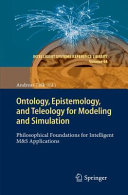

Most ebook files are in PDF format, so you can easily read them using various software such as Foxit Reader or directly on the Google Chrome browser.
Some ebook files are released by publishers in other formats such as .awz, .mobi, .epub, .fb2, etc. You may need to install specific software to read these formats on mobile/PC, such as Calibre.
Please read the tutorial at this link: https://ebookbell.com/faq
We offer FREE conversion to the popular formats you request; however, this may take some time. Therefore, right after payment, please email us, and we will try to provide the service as quickly as possible.
For some exceptional file formats or broken links (if any), please refrain from opening any disputes. Instead, email us first, and we will try to assist within a maximum of 6 hours.
EbookBell Team

4.1
80 reviewsIn this book, internationally recognized experts in philosophy of science, computer science, and modeling and simulation are contributing to the discussion on how ontology, epistemology, and teleology will contribute to enable the next generation of intelligent modeling and simulation applications.
It is well understood that a simulation can provide the technical means to display the behavior of a system over time, including following observed trends to predict future possible states, but how reliable and trustworthy are such predictions? The questions about what we can know (ontology), how we gain new knowledge (epistemology), and what we do with this knowledge (teleology) are therefore illuminated from these very different perspectives, as each experts uses a different facet to look at these challenges. The result of bringing these perspectives into one book is a challenging compendium that gives room for a spectrum of challenges: from general philosophy questions, such as can we use modeling and simulation and other computational means at all to discover new knowledge, down to computational methods to improve semantic interoperability between systems or methods addressing how to apply the recent insights of service oriented approaches to support distributed artificial intelligence.
As such, this book has been compiled as an entry point to new domains for students, scholars, and practitioners and to raise the curiosity in them to learn more to fully address the topics of ontology, epistemology, and teleology from philosophical, computational, and conceptual viewpoints.